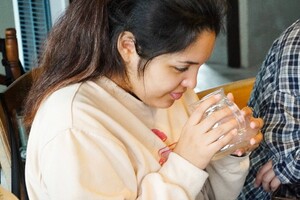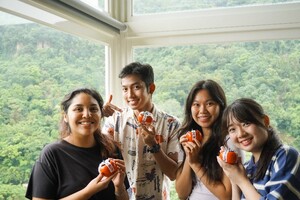CLC Students Head to the Mountains for Tea-picking and Experience the Serenity of Maokong












【Article by Chinese Language Center】
As July brings the summer heat and thunderstorms, the humid air becomes hard and harsh, especially at National Chengchi University (NCCU), which is nestled in the moisture-laden foothills. To beat the heat, the Chinese Language Center organized a field trip to the mountains to experience the tranquil world of tea at Maokong.
CLC students visited Uncle Well’s Tea Farm, one of Maokong’s most renowned tea farms. After a winding ride up the mountain roads, the students arrived, surrounded by misty hills and verdant landscapes. The activity of the day was a traditional “tea sealing” ceremony. We can trace this ceremony back to the Tang Dynasty, and it represents a ritual of hope and introspection. Wishes are written down and sealed together with tea leaves in a tea jar, left to rest until the day those hopes are fulfilled. When the day comes, people can open the tea jar and taste the memories and their mood at that time.
Taiwan boasts a rich and vibrant tea culture, with tea drinking deeply rooted in daily life, especially among the elderly. Wenshan, in particular, is a major production area for Baozhong(包種) and Tieguanyin(鐵觀音) teas. Given the region’s natural advantage and the cultural significance of tea in Chinese heritage, the Chinese Language Center has long incorporated tea-related knowledge into its curriculum. This allows students not only to learn Mandarin but also to engage directly with traditional Chinese culture. Knowledge from textbooks thus comes alive through the sensory experience.
At the tea farm, each student was given a beautifully crafted tea jar shaped like a persimmon, a propitious symbol in Chinese culture. The persimmon (柿, shì) is a homophone for the words in the phrase“everything goes as planned”(事事如意, shì shì rú yì), making the jar a container of a promising future rather than just a fruit-shaped object.
Students wrote their wishes using calligraphy brushes, carefully rolled and folded the notes, and placed them into the tea jar. Four sealing slips were then affixed to the tea jar, labeled with the student’s name, location, date, and the type of tea sealed inside, and then the ceremony was completed. But writing these wishes in Chinese was no easy task. Students had to understand deeply their personal aspirations and then find the appropriate vocabulary in the language they’re still learning—a process that was both challenging and admirable.
Following the sealing, students were introduced to the tea-making process, putting their language skills to further use. Many were already interested in Taiwanese tea and were fascinated to learn how different types of tea can be made from the same leaf. Uncle Well explained how fermentation levels, water temperature, and steeping time influence flavor. He also explained how strict and precise tea tasting competitions are—how even a single glance or movement from a judge could signal to a contestant whether their tea ranks high or falls short.
Finally came the tasting session. Students brewed their own tea and, after letting it steep for six minutes, then opened the lids to release a rich and inviting aroma. They tasted Baozhong, Tieguanyin, and Tieguanyin black tea—all Wenshan specialties. Even after the tea was poured, the lingering steam carried the deep scent of brewed leaves. Uncle Well encouraged students to inhale the aroma closely. They were amazed by how just a handful of leaves could create such a powerful sensory experience. What a refreshing field trip about tea!


 Fax:886-2-29379611
Fax:886-2-29379611